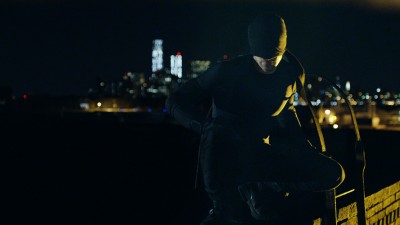
Netflix’s “Daredevil” has a lot to live up to. If the name is unfamiliar, it’s because Marvel has spent the last decade keeping quiet about one of their most endearing and fascinating intellectual properties. The character’s last live action outing in 2003 is widely considered by fans to be a low point in the superhero genre, on par with “Ghost Rider,” “Spider-Man 3” and “Superman Returns.” Despite being a box office hit, Ben Affleck’s campy rendition of old Hornhead seemed to drive a nail into the character’s coffin.
It follows, then, that Netflix’s rendition is emblematic of the best that the superhero genre and modern television have to offer — with DC finally picking up steam on their own movie universe, Marvel can’t afford any more slip-ups. “Daredevil” is exhilarating, fresh, starkly beautiful and dangerously binge-able.
Realized by creator Drew Goddard, a veteran “Buffy the Vampire Slayer” writer and director of the genre-bending “Cabin in the Woods,” the show offers a startling change of pace for the Marvel Cinematic Universe. Goddard’s version of Hell’s Kitchen, one of New York’s real-life bohemian centers, is seedy and crumbling, an area of the city that was hit hard by the Chitauri attack in “The Avengers” and is slipping through the cracks as it tries to rebuild. With its damaged and enigmatic characters and its brutal depiction of urban crime, “Daredevil” feels less like a superhero show and more like an excellent genre piece that happens to be about a superhero.
And for a superhero, Matthew Murdock isn’t very super. Played with terse control and a remarkably convincing accent by Londoner Charlie Cox, Murdock is a young and idealistic blind lawyer with a troubled past and an uncertain future – and no superpowers. He and best friend Foggy Nelson (Elden Henson) have started their own law firm, and are liable to lose it if they continue to reject clients with questionable motives. Matt Murdock isn’t powerful; as Foggy and many other characters point out, he doesn’t have a magic hammer or a suit of armor. But at night, as the Devil of Hell’s Kitchen, Murdock is a terrifying force to be reckoned with.
While not super strong, airborne, or immortal, Matt Murdock’s childhood trauma of losing his vision mysteriously heightened his other senses over time (a trait that is played for deliciously implicit comic relief when Murdock is feigning disability). The show’s writers do well not to explain Daredevil’s super-senses immediately or in-depth, and it isn’t until the middle of the season that they let the audience in on how Matt fine-tuned his skills to make him a master martial artist. Both of these restraints make the Man Without Fear all the more fear inducing when he’s on screen – it’s impossible to know what amazing feat of combat or surveillance Murdock will display next.
Despite, or perhaps as a result of, the sporadic nature of the show’s action sequences, the title character’s appearances are one of the show’s greatest strengths. Charlie Cox and the excellent cinematography and choreography make Daredevil the ferocious monster that Batman films have been trying to portray for decades. Film snobs will be happy to know that shaky cam and fast, incoherent cuts are practically nonexistent in “Daredevil.” When fists fly, the camera stays put, and the audience can see and feel every hit connect and do damage, often in ways that owe credit to brutal films like “The Raid” and “Oldboy.” While Matt Murdock the lawyer is calm and brief, the Devil of Hell’s Kitchen is furious, unrestrained and constantly enduring excruciating beatings with repercussions that last long into the following episodes. Cox and Goddard have created a bloody beast that’s consistently more exciting to watch than Christian Bale’s hammy and calculated “Where were the drugs going?”
As if the show didn’t have enough aspects that scream “postmodern television dramatic anti-hero,” Murdock is torn between his violent actions and his latent Catholicism, a dichotomy that is artfully represented in flashbacks of his prize-fighting Irish American father, played charmingly by John Patrick Hayden. Charlie Cox consistently gives a performance that is heartbreaking in its restraint, fury bubbling below the surface, best exemplified by a tense scene in which he asks his priestly confidant “Do you think the devil walks among us?”
The devil in question is Wilson Fisk, a self-made millionaire and shady contractor whose underground dealings are knowingly tearing apart the poor citizens of Hell’s Kitchen. Played with chilling grace and conscious cruelty by Vincent D’Onofrio, the MCU’s Fisk is a far cry from the corpulent slimy mobster known as Kingpin in the comics. Here, he is calculating as well as tragic, a grounded villain that neither chews the scenery nor monologues about his plans. Fisk isn’t so much one step ahead of Daredevil as he is stepping circles around everyone else in the show; his connections and skills of extortion give the audience good reason to believe in the necessity of the hero’s secret identity, especially in a world where every other hero introduced has nothing to hide.
D’Onofrio must be thrilled to have the pleasure of playing the second most fascinating character on the show. As the season progresses, we learn that this Kingpin is shy and reserved, awkward around women and traumatized by a past a shade darker even than Murdock’s. Most interesting of all is that he too believes he’s saving his city, and when he unleashes his wrath on those who oppose him, it is as bone-chilling as it is difficult to look away. No other MCU villain comes close to Fisk’s terror.
With all of these gory drug deals, violent interrogations and mortifying characters, “Daredevil” stakes a bold and unexpected claim as the only Marvel title that I wouldn’t let my little brother watch. In the market saturated with saccharine villain-of-the-week pulp series like “Arrow” and “Agents of S.H.I.E.L.D.,” as well as dozens of superhero films that have succeeded in getting the moms and sisters into theater seats, “Daredevil” is different. It is a Netflix property through and through: mature, cheeky, violent, delectable, complicated and tempting to consume in large, heady gulps. At a time when the “cape and mask” genre is finally starting to grate and bore, “Daredevil” proves that the modern mythology of comic books isn’t dying any time soon.














